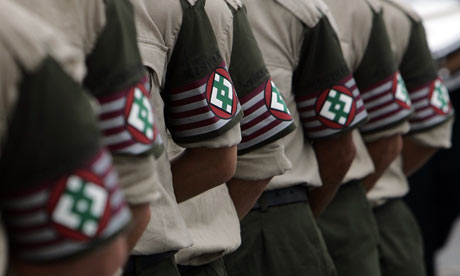Party chairman Nick Griffin was elected an MEP in the northwest of England region with eight percent of the vote, hours after Andrew Brons won the BNP’s first ever European seat in the nearby Yorkshire and the Humber region.
Griffin had earlier hailed Brons’ win — with almost 10 percent of the vote — as “a huge breakthrough” for his party, and used the victory to reiterate his party’s anti-immigration and anti-Islam stance.
He denied his party was racist, but said: “We do say this country is full up. The key thing is to shut the door.”
Griffin told Sky News television: “This is a Christian country and Islam is not welcome, because Islam and Christianity, Islam and democracy, Islam and women’s rights do not mix.
“That’s a simple fact that the elites of Europe are going to have to get their heads round and deal with over the next few years.”
The result is a vindication of efforts by Griffin, who was educated at the prestigious Cambridge University, to recast the party since taking over in 1999, emphasising its grassroots activism over extreme-right ideology.
Amid concerns about soaring unemployment and a deep recession and in particular the demise of the country’s manufacturing base, the BNP has pledged British jobs for British workers.
It is opposed to European integration and wants to pull Britain out of the European Union and halt all immigration to the country.
In recent weeks it has also capitalised on public anger over the row over lawmakers’ expenses, which has severely damaged the reputation of parliament and the mainstream Labour and Conservative parties.
Health minister Andrew Burnham described the BNP’s first MEP victory as a “sad moment“, and following Griffin’s success in the northwest, local Labour MP Tony Lloyd said he was ashamed at how some people had voted.
“I am genuinely not just disappointed, I think it is a matter of shame, this country has a deserved reputation for a tolerant society,” said Lloyd, the Labour MP for Manchester Central.
“Their (the BNP) vision for Britain is a nightmare for Britain. I think many people will wake up with some sense of shame.”
Government ministers and the Conservative party had sought to remind voters of the BNP’s policies, which include calls for the immediate halt to all immigration to Britain and the “voluntary resettlement” of all immigrants.
Copyright © 2009 AFP. All rights reserved.
Source: www.google.com, 08.06.2009
[2]
Sarkozy: “Islamization is Inevitable”
There is nothing new here. We knew what Sarkozy’s vision of the future was: an “Islam of France”, “métissage” between races and ethnic groups, dissolution of nationalist, regional, and ethnic identities, subjugation to Brussels, openness to socialism, and a Turkey as closely aligned with Europe as possible, etc…
But it’s always sobering to hear it again, from one who knows Sarkozy personally. Philippe de Villiers was interviewed by the weekly Famille Chrétienne. The Catholic blogLe Salon Beige relates part of the interview:
– Why are you so focused on the theme of Turkey and Islamization?
– Quite simply because we will see the first transformations of churches into mosques in the coming three years. At any rate, that is what Nicolas Sarkozy told me.
– When?
– I had an in depth discussion with him at Elysée at the end of last year. He said to me: “You have intuition, I have the figures. And your intuition is confirmed by my figures. The Islamization of Europe is inevitable.” Careful: it’s a process that will not occur overnight, but will take decades.
– Why does this issue appear to be of central importance to you?
– Most politicians have a comforting ignorance of what Islam is and propose transforming Europe into a supermarket of competing religions. Unaware that Islam is not only a religion since, by melding the temporal and the spiritual, it imposes a law. But behind this comforting ignorance of politicians, there are those who know. (…) The reality is that we are headed for a criss-cross [chassé-croisé] with, on one side, Europe and its en masse abortions, its promotion of gay marriage, and on the other, immigration en masse (…)
“Chassé-croisé” is virtually impossible to translate. Originally a choreographic term, it usually refers to a crowded movement in one direction that passes but never encounters a crowded movement in another direction. Sometimes it is just kept as is in English.
– Aren’t you exaggerating the dimensions of the phenomenon?
– No. The crux of the issue is simple: Europe is refusing its own demographic future. And it is working with a fearsome weapon towards this end, written into the Charter of fundamental rights appended to the treaty of Lisbon: the promotion of gay marriage. This in turn is accomplished through the principle of non-discrimination and the disassociation of marriage from the sex of the spouses (which appears in article 7 of the Charter of fundamental rights). In reality, there are two weapons being used by European leaders to kill Europe demographically: the promotion of gay marriage and en masse abortions. And a third: the recourse to immigration that is 80% Islamic in order to replace the people who are no longer there (…)
A spokesman for Elysée protested saying: “Philippe de Villiers is not the spokesman for Elysée. He makes multiple declarations on this topic, declarations that obviously need to be regarded with caution.”



